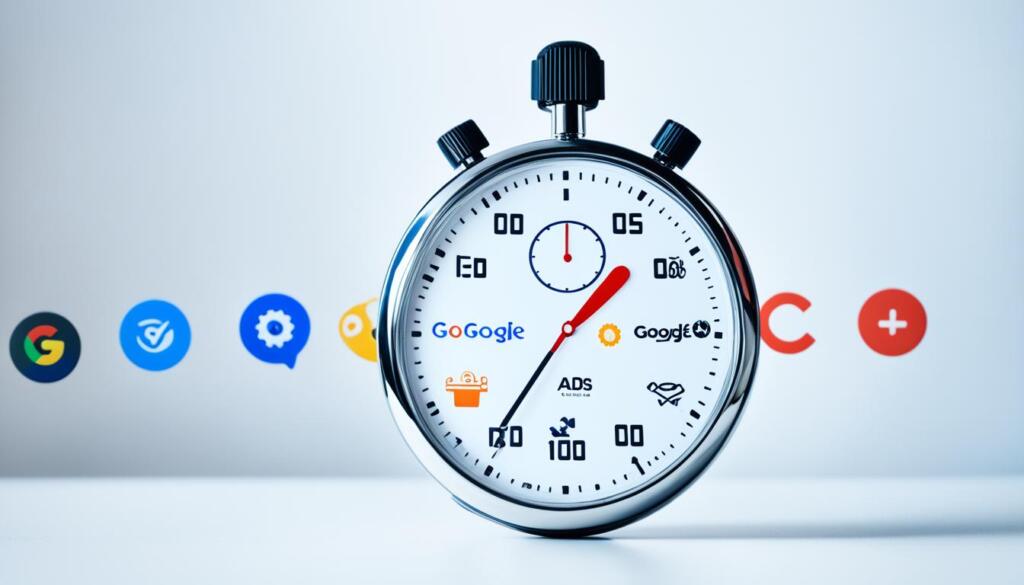Google Ads has revolutionized the way businesses advertise online, offering a flexible platform that allows users to reach their target audience with precision. One of the key aspects of this flexibility is the ability to cancel Google Ads anytime. This unparalleled feature provides users with the freedom to adapt their ad campaign management as per their requirements, ensuring optimal results.
In this article, we will delve into the concept of flexibility in Google Ads, exploring how it empowers businesses to make changes to their ad campaigns and cancel them at any time. We will also shed light on the benefits of this flexibility and guide you through the process of canceling Google Ads effectively.
Key Takeaways:
- Google Ads allows users to cancel their ad campaigns at any time, providing unparalleled flexibility.
- This flexibility empowers businesses to make changes to their campaigns and allocate budgets effectively.
- To cancel Google Ads, users need to navigate the account settings and identify the cancellation options.
- Before canceling, it is important to evaluate campaign performance and consider the timing for cancellation.
- Terminating Google Ads without penalties and understanding the billing process are essential factors to consider.
Understanding Google Ads’ Flexibility
In today’s digital landscape, Google Ads offers businesses a powerful platform to reach their target audience and promote their products or services. One of the key features that sets Google Ads apart is its flexibility, which allows businesses to effectively manage their ad campaigns and achieve their advertising goals. In this section, we will explore how Google Ads works for businesses and discuss the benefits of flexible ad campaign management.
How Google Ads Works for Businesses
Google Ads operates on a pay-per-click (PPC) advertising model, where businesses bid on specific keywords relevant to their products or services. When a user performs a Google search using these keywords, Google’s algorithm displays relevant ads at the top or bottom of the search results page. This targeted approach ensures that businesses can reach audiences who are actively searching for what they offer.
By utilizing the flexibility of Google Ads, businesses can precisely target their desired audience based on factors such as location, age group, and interests. This level of targeting ensures that their ads are shown to people who are most likely to be interested in their offerings, increasing the chances of conversion and maximizing return on investment.
Benefits of Flexible Ad Campaign Management
The flexibility of Google Ads extends beyond targeting options. Ad campaign management within Google Ads allows businesses to make changes to their campaigns and allocate budgets as needed. This flexibility is especially valuable in today’s fast-paced business environment, where agility and adaptability are key factors for success.
With Google Ads, businesses have the flexibility to:
- Adjust ad copy and creative elements to optimize performance
- Pause, resume, or end campaigns based on real-time data and performance
- Allocate budgets across different campaigns to maximize ROI
- Run multiple ad variations to test different messaging or targeting strategies
This level of control empowers businesses to refine their advertising strategies, respond to market changes, and continuously improve campaign performance. By leveraging the flexibility of Google Ads, businesses can achieve their advertising objectives with greater efficiency and effectiveness.
Now that we have explored the concept of flexibility in Google Ads and understand how it works for businesses, in the next section, we will address the primary question: Can I cancel Google Ads anytime? We will provide a comprehensive answer, discussing the flexibility offered by Google Ads’ cancellation policy.

Can I Cancel Google Ads Anytime?
One of the key advantages of using Google Ads is the flexibility it offers in terms of campaign management. The Google Ads cancellation policy allows users to cancel their ad campaigns anytime they choose, giving them complete control over their advertising strategy. Whether you need to pause a campaign temporarily or stop it entirely, Google Ads gives you the freedom to make changes as your business needs evolve.
Canceling your Google Ads campaign is a straightforward process that can be done easily within your Google Ads account.

By canceling your Google Ads, you have the power to adjust your advertising strategy based on real-time insights, market trends, or changes in your business objectives. It allows you to allocate your budget effectively and make data-driven decisions to maximize your return on investment.
With the ability to cancel Google Ads anytime, you have the flexibility to adapt and optimize your advertising strategy based on your business needs. Whether you need to reallocate your budget, pause campaigns during a slow season, or pivot your marketing efforts, Google Ads gives you the freedom to make changes as necessary.
Next, we will guide you through the steps to cancel your Google Ads and explore the important details of Google Ads’ cancellation policy.
Steps to Cancel Google Ads
Navigating and canceling Google Ads is a straightforward process that ensures flexibility for advertisers. In this section, we will guide you through the necessary steps to cancel your Google Ads and provide insights to help you navigate the account settings.
Navigating Google Ads Account Settings
Canceling your Google Ads starts with accessing your account settings. To get started, follow these simple steps:
- Log in to your Google Ads account using your credentials.
- Click on the gear icon located in the top right corner of your screen to access the account settings.
- In the dropdown menu, select “Account settings.”
- Once in the account settings, navigate to the “Billing & payments” section.
- Locate the “Cancel” option, usually found under the “Billing preferences” or “Payment settings.”
Note: The UI may vary slightly based on updates or changes made by Google Ads.
Identifying the Cancellation Options
After accessing the account settings, you will find various cancellation options to consider based on your specific needs. These options may include:
- Pausing campaigns: Pausing your campaigns allows you to temporarily halt your advertising efforts while retaining your campaign data and settings.
- Stopping campaigns: Stopping your campaigns completely terminates all active ads and stops your advertising efforts immediately.
- Adjusting budgets: Instead of canceling your campaigns, you can make adjustments to your ad budgets, reducing or reallocating funds to optimize your advertising strategy.
Note: It is important to carefully evaluate your advertising goals and objectives to determine the most appropriate cancellation option for your specific needs.
By following these steps and considering your cancellation options, you can effectively cancel your Google Ads. Now, let’s delve deeper into Google Ads’ cancellation policy in Section 5.
Google Ads Cancellation Policy Breakdown
Understanding the Google Ads cancellation policy is essential before proceeding with the cancellation of your ad campaigns. This section will provide a comprehensive breakdown of the policy, outlining the terms and conditions associated with ad campaign cancellation.
The Google Ads cancellation policy ensures that users have the flexibility to make changes to their advertising strategies and budgets as needed. It allows advertisers to adapt their campaigns based on market conditions, business goals, and audience response.
When considering the cancellation of your Google Ads, it is important to be aware of the following key points:
- Ad campaign cancellation: Google Ads provides the option to cancel your ad campaigns at any time, giving you full control over your marketing efforts.
- Contractual obligations: Unlike some advertising platforms, Google Ads does not impose any long-term contractual obligations or lock-in periods. You have the freedom to cancel your campaigns whenever necessary.
- Immediate effect: Once an ad campaign is canceled, the ads will immediately stop running, and your budget will no longer be spent on advertising.
- No cancellation fees: Google Ads does not charge any cancellation fees for terminating your ad campaigns. You will only be billed for the period during which your ads ran.
To better understand the Google Ads cancellation policy, refer to the table below:

| Policy | Details |
|---|---|
| Ad Campaign Cancellation | Users have the flexibility to cancel their ad campaigns at any time without incurring any penalties or cancellation fees. |
| Immediate Effect | Once a campaign is canceled, the ads will immediately stop running, and the budget allocation for the campaign will cease. |
| Contractual Obligations | Google Ads does not impose any long-term contractual obligations on advertisers, allowing for greater freedom and flexibility. |
| Cancellation Fees | There are no cancellation fees associated with terminating your Google Ads campaigns. You will only be billed for the period during which your ads were active. |
By familiarizing yourself with the Google Ads cancellation policy, you can confidently make decisions regarding the cancellation of your ad campaigns. It’s important to note that while cancellation is an option, there are also alternatives to consider, such as optimizing your campaigns or adjusting your budget to better align with your business objectives.
Best Practices Before Ending Google Ads
Before ending your Google Ads campaigns, it’s crucial to follow best practices to ensure optimal results. Evaluating campaign performance and considering the timing for campaign cancellation are key factors to consider.
Evaluating Campaign Performance
Assessing the performance of your Google Ads campaigns is essential before deciding to end them. Take the time to review the key metrics and data to gain insights into the effectiveness of your ads. Evaluate factors such as click-through rates, conversion rates, and return on investment.
By analyzing this data, you can identify any areas of improvement or potential issues that need to be addressed before making a final decision. This evaluation will help you make data-driven decisions and ensure that you are making informed choices for your ad campaign.
Considering the Timing for Campaign Cancellation
Timing is crucial when it comes to ending your Google Ads campaigns. Consider the current stage of your campaign and assess whether it is the right time to cancel. Look at factors like seasonality, market trends, and the performance of your competitors.
It’s important to strike a balance between maximizing results and avoiding unnecessary expenditures. Closely monitor the performance of your ads and make sure to end them at a strategic point that aligns with your goals.
By carefully evaluating campaign performance and considering the timing for cancellation, you can ensure that you make the most of your Google Ads investment and achieve your desired outcomes.

When to Stop Google Ads: Timing & Strategy
Timing plays a crucial role in the effectiveness of Google Ads campaigns. Understanding when to stop your ad campaign can help you maximize results and make strategic decisions. In this section, we will explore how seasonal trends and ad timing impact the performance of your campaigns. We will also provide insights into strategic planning for campaign pauses, enabling you to optimize your ad strategy.
Seasonal Trends and Ad Timing
Seasonal trends can significantly influence the performance of your Google Ads campaigns. By aligning your ad timing with relevant events, holidays, or peak shopping seasons, you can reach your target audience when they are most likely to engage with your ads. For example, a clothing retailer may want to intensify their ad campaigns leading up to Black Friday or during the summer season to promote seasonal sales.
Understanding these seasonal trends allows you to allocate your advertising budget wisely and capture the attention of potential customers during key moments. By analyzing historical data and market research, you can identify the periods when your target audience is most active and adjust your ad timing accordingly.
Strategic Planning for Campaign Pauses
Pausing your Google Ads campaigns strategically can be a powerful technique to optimize your ad performance. There may be times when you need to temporarily halt your campaigns for various reasons, such as shifting budgets, product launches, or adjusting your marketing strategy.
By carefully planning campaign pauses, you can ensure that your ads are running during the most impactful periods. For example, if you operate a business with seasonal fluctuations in demand, you may consider pausing your campaigns during off-peak periods to save on ad spend. This allows you to redirect your budget towards peak periods when your target audience is more likely to convert.
Strategic campaign pauses also give you the opportunity to assess your campaign performance, make necessary adjustments, and refine your ad strategy. By analyzing the data during these pauses, you can identify areas of improvement and implement changes that will enhance the overall effectiveness of your campaigns.
Remember, finding the right timing and strategy for your Google Ads campaigns may require continuous monitoring and optimization. It’s essential to stay informed about industry trends, consumer behavior, and adjust your ad timing and strategy accordingly to ensure the success of your campaigns.

How to Terminate Google Ads Without Penalties
When it comes to ad campaign flexibility, terminating Google Ads without incurring any penalties is crucial. The last thing you want is to face adverse consequences or penalties when canceling your campaigns. Luckily, there are measures you can take to ensure a smooth cancellation process without any negative repercussions. Here’s a step-by-step guide on how to cancel your Google Ads campaigns without penalties:
- Assess your campaign performance: Before terminating your ads, it’s important to evaluate the performance of your campaign. Take a close look at the key metrics and determine if your ads are effectively reaching your target audience and generating the desired results. This analysis will help you make informed decisions about canceling your campaigns.
- Allocate budgets effectively: Before canceling your campaigns, consider reallocating your budgets to optimize your remaining budget utilization. This strategic move can help you maximize your ad spend and achieve better returns on investment.
- Make data-driven decisions: When canceling your Google Ads campaigns, rely on data to guide your decision-making process. Analyze the performance data and identify any trends or patterns that could inform your cancellation strategy. This data-driven approach ensures you’re making informed choices rather than acting on impulse.
By following these steps, you can terminate your Google Ads campaigns without penalties and maintain the flexibility you need in managing your ad campaigns effectively.

Google Ad Campaign Cancellation vs. Pausing
When it comes to managing Google Ads, users often find themselves grappling with a common dilemma: whether to cancel or pause their ad campaigns. Understanding the differences between these two options and their impact on data and analytics can help users make informed decisions about their advertising strategies.
Differences Between Cancellation and Pausing
Cancelling a Google Ads campaign involves permanently ending the campaign and stopping all associated ads. This means that the campaign will no longer be active and will no longer appear in search results or other ad placements.
On the other hand, pausing a campaign temporarily suspends its activity. While paused, the campaign will not serve any ads, but the campaign structure and data remain intact. Pausing allows users to resume the campaign at a later date without losing data or having to rebuild the campaign from scratch.
Pausing a campaign is a useful tactic when users want to temporarily halt their advertising efforts, such as during holiday breaks or when experiencing a temporary budget constraint. It provides the flexibility to resume the campaign seamlessly when conditions are more favorable.
Impact on Data and Analytics
When users cancel a campaign, all associated data, including campaign performance metrics, historical data, and audience insights, may be lost. This loss of data can make it challenging to analyze past campaign performance, track trends, or make data-driven decisions for future campaigns.
However, when a campaign is paused, the data and analytics associated with that campaign remain accessible. This enables users to continue monitoring performance, tracking changes in audience behavior, and refining their advertising strategy based on the available insights.
In summary, while cancellation permanently ends a campaign and may result in the loss of valuable data, pausing allows users to temporarily suspend a campaign while retaining access to campaign data for future analysis and optimization.

| Google Ad Campaign Cancellation | Google Ad Campaign Pausing |
|---|---|
| Permanently ends the campaign | Temporarily suspends the campaign |
| Stops all associated ads | Temporarily halts ad serving |
| Loss of campaign data and analytics | Retains campaign data and analytics |
| Cannot resume the campaign directly | Can resume the campaign seamlessly |
Understanding the differences between Google Ad campaign cancellation and pausing empowers users to make choices that align with their advertising goals and requirements. Whether it’s opting for cancellation when ending a campaign permanently or pausing to temporarily suspend ads, users can leverage these options to effectively manage their Google Ads campaigns.
For more information on managing and optimizing your Google Ads campaigns, visit the Google Ads support page.
Consequences of Immediate Google Ads Cancellation
While the flexibility to cancel Google Ads anytime offers users the freedom to adjust their advertising strategies, immediate cancellation can have certain consequences. Before making the decision, it is essential to consider the potential impacts that ad campaign cancellation may entail.
By canceling Google Ads without proper planning or analysis, businesses may experience the following consequences:
- Loss of Immediate Visibility: Immediate Google Ads cancellation could lead to an abrupt drop in visibility and exposure to potential customers. Without active ads, businesses might miss out on reaching their target audience, potentially impacting sales and brand awareness.
- Disruption in Lead Generation: Ad campaigns are an effective tool for generating leads and driving traffic to websites. Cancelling Google Ads immediately can disrupt the lead generation process, resulting in a decline in conversions and customer acquisition.
- Unoptimized Budget Allocation: When ads are canceled without evaluating their performance, businesses risk allocating budget resources inefficiently. Without analyzing the data and making informed decisions, a sudden cancellation might lead to wastage of allocated budget and missed opportunities.
- Delayed Results: Immediate cancellation of Google Ads campaigns may delay the desired outcomes that businesses are striving to achieve. Rome wasn’t built in a day, and the same holds true for advertising campaigns. It takes time for ads to gain momentum and deliver desired results.
- Missed Testing Opportunities: Ad campaigns provide valuable insights into audience behavior, which can inform future marketing strategies. By cancelling ads immediately, businesses may miss out on gathering crucial data and conducting meaningful tests that could have enhanced their campaign effectiveness.
It’s important to note that the consequences of immediate Google Ads cancellation can vary based on individual circumstances and campaign objectives. Businesses are advised to carefully evaluate the potential impacts and consider alternative strategies before choosing to cancel their ad campaigns.
“Immediate cancellation of Google Ads can have repercussions on a business’s visibility, lead generation, and budget allocation. Careful consideration and evaluation of the potential consequences are essential before making a decision.”
For a more comprehensive understanding of the consequences of immediate Google Ads cancellation, read our guide here.
Google Ads Account Cancellation and Billing
When it comes to canceling your Google Ads account, understanding the billing process is essential. After canceling your account, there are a few important factors to consider, such as final billing and potential refunds or adjustments.
Understanding Final Billing After Cancellation
Once you cancel your Google Ads account, you will still receive a final bill for any outstanding charges. This bill will include any costs incurred up until the cancellation date, such as clicks and impressions that were generated by your ads. It’s important to review this final billing statement to ensure accuracy and reconcile any outstanding payments.
To view your final billing statement, simply navigate to your Google Ads account settings and locate the billing section. This will provide you with a detailed breakdown of the charges that were incurred before the cancellation.
Refunds and Adjustments Post-Cancellation
In some cases, you may be eligible for refunds or adjustments after canceling your Google Ads account. These refunds or adjustments typically occur if you have pre-paid for future ad costs or if there were any billing errors or discrepancies.
If you believe you are entitled to a refund or adjustment, it’s important to reach out to Google Ads support for assistance. They will be able to review your account and ensure that any necessary refunds or adjustments are processed accordingly.
For more information on Google Ads account cancellation and billing, you can refer to the following resources:
Restarting a Google Ads Campaign After Cancellation
Sometimes, you may find yourself wanting to restart a Google Ads campaign after canceling it. Whether it’s due to changes in your marketing strategy, budget adjustments, or simply a desire to reach your target audience again, resuming ad campaigns can be a valuable tactic to achieve your advertising goals.
When restarting a Google Ads campaign, it’s essential to follow a few key steps to ensure a smooth and successful relaunch. By taking a strategic approach, you can optimize your campaign’s performance and make the most of your advertising budget. Here are some tips:
- Evaluate your previous campaign: Before restarting your Google Ads campaign, take the time to analyze its performance. Review the data and insights from your previous campaign to identify areas for improvement. This analysis will help you make informed decisions when relaunching your campaign.
- Refine your targeting: Use the information gathered from your previous campaign to refine your target audience. Consider factors such as demographics, interests, and online behaviors to ensure your ads reach the right people. Refining your targeting will help you maximize the impact of your advertising efforts.
- Update your ad creatives: Take the opportunity to refresh your ad creatives when restarting your campaign. Develop compelling and engaging ads that resonate with your target audience. Use eye-catching visuals, captivating headlines, and persuasive copy to capture attention and drive conversions.
- Set realistic goals: When relaunching your Google Ads campaign, set realistic and measurable goals. Determine what you want to achieve with your advertising efforts and establish key performance indicators (KPIs) to track your progress. Setting clear goals will help you stay focused and measure the success of your campaign.
By following these steps, you can effectively and efficiently restart your Google Ads campaign after cancellation. Remember to continuously monitor and optimize your campaign’s performance to ensure you’re achieving your desired results.
To learn more about restarting a Google Ads campaign, visit the official Google Ads Help Center. The Help Center provides comprehensive guidance and resources to assist you in making the most of your Google Ads experience.
Google Ads Cancellation Process Explained Step by Step
In this section, we will provide a step-by-step explanation of the Google Ads cancellation process. Whether you’re looking to end your ad campaigns or explore alternative strategies, understanding how to cancel Google Ads is essential. Follow these steps to seamlessly navigate the cancellation process:
Preparing for Campaign Cancellation
Prior to canceling your Google Ads, it’s important to prepare and gather the necessary information. Consider the following steps:
- Review your current ad campaigns and assess their performance.
- Identify any ongoing commitments or contractual obligations.
- Download and save any important data or analytics for future reference.
By preparing in advance, you can ensure a smooth transition and minimize any potential disruptions to your advertising efforts.
Executing the Cancellation Process
Once you’ve adequately prepared, follow these steps to cancel your Google Ads:
- Access your Google Ads account by signing in.
- Navigate to the account settings page.
- Locate the cancellation options.
- Follow the prompts to initiate the cancellation process.
- Confirm your cancellation request.
After confirming your cancellation request, Google Ads will process it accordingly, and your ad campaigns will be discontinued. It’s important to note that your billing will be adjusted accordingly, and you may be eligible for a refund or credit, depending on your specific circumstances.
By following these step-by-step instructions, you can effectively cancel your Google Ads and make informed decisions regarding your advertising strategy. Remember to review your alternatives and explore optimization strategies before finalizing your cancellation.
Alternatives to Cancelling Your Google Ads Campaign
Instead of canceling your Google Ads campaign, there are alternative strategies that you can explore to optimize your ad campaigns and achieve your desired results. By making adjustments to your ad strategies and budgets, you can effectively manage your campaigns without resorting to cancellation.
Optimization Instead of Cancellation
Optimizing your ad campaigns involves making data-driven decisions to improve performance and maximize your return on investment (ROI). Rather than canceling your campaigns, you can analyze the data and identify areas for improvement. By adjusting your targeting, keywords, ad copy, or bidding strategy, you can optimize your campaigns to achieve better results.
For example, if your campaign is not generating the desired click-through rates (CTRs), you can refine your ad copy to make it more compelling and relevant to your target audience. By conducting A/B testing and experimenting with different variations, you can determine which elements are driving better performance and make informed optimizations.
Optimization also involves monitoring and analyzing key metrics such as conversion rates and cost per conversion. By tracking these metrics, you can identify campaigns or keywords that are underperforming and make necessary adjustments. This continuous monitoring and optimization process allows you to refine your campaigns over time and achieve better results.
Exploring Different Ad Strategies and Budget Adjustments
In addition to optimization, exploring different ad strategies and adjusting your budget can provide alternatives to canceling your Google Ads campaign. Consider experimenting with different ad formats, such as display ads, video ads, or responsive search ads, to expand your reach and engage with your target audience in different ways.
Furthermore, adjusting your ad budget can help you allocate resources more effectively. Instead of canceling your campaign entirely, you can reduce your budget for underperforming campaigns and reallocate those funds to campaigns that are delivering better results. This strategic budget adjustment allows you to optimize your spending and focus on campaigns that are driving the highest ROI.
According to experts at HawkSEM, pausing certain ad campaigns temporarily can also be a viable alternative to cancellation. By analyzing campaign performance and seasonal trends, you can identify periods of low conversion rates or high competition where pausing the campaign may be more effective than cancellation. This approach allows you to conserve your budget while still maintaining the campaign’s settings and historical data.
Optimizing your ad campaigns and exploring different strategies and budget adjustments provide alternatives to canceling your Google Ads campaign. By leveraging these alternatives, you can adapt and optimize your campaigns to achieve your advertising goals without the need for cancellation.
Expert Tips on Managing Google Ads Commitments
When it comes to managing your Google Ads commitments, there are key strategies you can employ to ensure success. In this section, we will provide expert tips on making data-driven decisions and implementing long-term planning for your ad campaigns.
Making Data-Driven Decisions
One of the fundamental aspects of managing Google Ads commitments is leveraging data to drive your decision-making process. By analyzing the performance metrics of your ad campaigns, you can identify patterns, trends, and areas for improvement. Make use of the Google Ads platform’s robust reporting capabilities to gather insights on click-through rates, conversions, and engagement metrics.
When making data-driven decisions, consider the following:
- Identify underperforming keywords or ad groups and allocate budgets accordingly
- Regularly monitor and optimize your ad campaign settings to ensure ad placements are effective
- Utilize A/B testing to experiment with different ad variations and landing pages
By basing your decisions on concrete data, you can refine your ad campaigns and maximize their performance.
Long-Term Planning for Ad Campaigns
While it’s important to monitor and adjust your Google Ads campaigns in real-time, long-term planning is equally crucial. Taking a strategic approach to your ad campaigns can help you achieve sustainable results over time.
Consider the following tips for long-term ad campaign planning:
- Set clear objectives for your ad campaigns and align them with your overall marketing goals
- Develop a comprehensive keyword strategy to reach your target audience effectively
- Establish a consistent budget allocation plan that aligns with your advertising goals
Additionally, regularly assess the performance of your ad campaigns and make adjustments as necessary. Keep an eye on industry trends, customer behavior, and market dynamics to stay ahead of the competition.
By combining data-driven decision-making with long-term planning, you can optimize your Google Ads campaigns for maximum effectiveness and drive continuous growth for your business.
Continue reading to discover more insights and best practices for effectively managing your Google Ads commitments.
Conclusion
In conclusion, this article has explored the flexibility of canceling Google Ads anytime. Throughout the article, we have covered various aspects of the cancellation process, providing insights into alternative strategies and offering expert tips. By understanding the flexibility offered by Google Ads, users can effectively manage their ad campaigns and achieve their advertising goals.
We have discussed the benefits of flexible ad campaign management, including the ability to make changes to campaigns and allocate budgets as needed. Additionally, we have provided step-by-step guidance on how to navigate the Google Ads account settings to find the cancellation options and execute the cancellation process. By following best practices and evaluating campaign performance before ending Google Ads, users can optimize their results.
Furthermore, we have explored the impact of timing and strategic planning on ad campaign effectiveness. By considering seasonal trends and strategically pausing campaigns, users can maximize their advertising efforts. We have also highlighted the importance of terminating Google Ads without penalties and the differences between cancellation and pausing.
To sum up, this article has equipped readers with comprehensive knowledge on canceling Google Ads anytime. By following the insights and best practices shared, users can confidently manage their ad campaigns, make data-driven decisions, and achieve long-term success. Remember, flexibility is the key to effectively navigating the world of Google Ads!
FAQ
Can I cancel Google Ads anytime?
Yes, you can cancel Google Ads anytime. Google Ads provides users with the flexibility to end their ad campaigns whenever they choose.
How do Google Ads work for businesses?
Google Ads work by allowing businesses to target specific keywords and display ads to relevant audiences. This helps businesses reach their target audience effectively.
What are the benefits of flexible ad campaign management?
Flexible ad campaign management provides numerous benefits, such as the ability to make changes to campaigns, allocate budgets as needed, and optimize ad performance.
What steps do I need to take to cancel Google Ads?
To cancel Google Ads, you need to navigate to the Google Ads account settings and identify the cancellation options. From there, you can follow the provided steps to cancel your ad campaigns.
What is Google Ads’ cancellation policy?
Google Ads’ cancellation policy allows users to cancel their ad campaigns at any time. However, it is essential to familiarize yourself with the terms and conditions related to ad campaign cancellation.
What are the best practices before ending Google Ads?
Before ending Google Ads, it is important to evaluate campaign performance and consider the timing for campaign cancellation. This helps ensure you maximize results and make informed decisions.
When is the best time to stop Google Ads?
The timing for stopping Google Ads depends on various factors, including seasonal trends and strategic planning for campaign pauses. By considering these factors, you can optimize your ad campaign effectiveness.
How can I terminate Google Ads without penalties?
To terminate Google Ads without penalties, it is crucial to follow the correct cancellation process. By canceling your ad campaigns correctly, you can avoid any adverse consequences or penalties.
What is the difference between canceling and pausing a Google Ads campaign?
Canceling a Google Ads campaign permanently ends the campaign, while pausing a campaign puts it on hold temporarily. Additionally, canceling a campaign may impact data and analytics differently compared to pausing.
What are the consequences of immediately canceling Google Ads?
Immediately canceling Google Ads can have certain consequences, such as a sudden drop in ad visibility and potential fluctuations in website traffic. It is important to consider these consequences before making a decision.
How does Google Ads handle account cancellation and billing?
After canceling your Google Ads account, you will receive a final billing statement. Google Ads also provides information on refunds and adjustments that may be applicable post-cancellation.
Can I restart a Google Ads campaign after cancellation?
Yes, you can restart a Google Ads campaign after canceling it. However, it is important to carefully evaluate your goals and re-configure your ad campaigns to ensure effectiveness.
What is the step-by-step process for canceling Google Ads?
To cancel Google Ads, you need to prepare for campaign cancellation by reviewing your account and then execute the cancellation process through the Google Ads account settings.
Are there alternatives to canceling a Google Ads campaign?
Instead of canceling a Google Ads campaign, you can explore optimization strategies to enhance campaign performance. This can involve adjusting ad strategies and budgets to achieve desired results.
What are some expert tips for managing Google Ads commitments?
Expert tips for managing Google Ads commitments include making data-driven decisions, evaluating campaign performance regularly, and implementing a long-term planning approach for ad campaigns.


